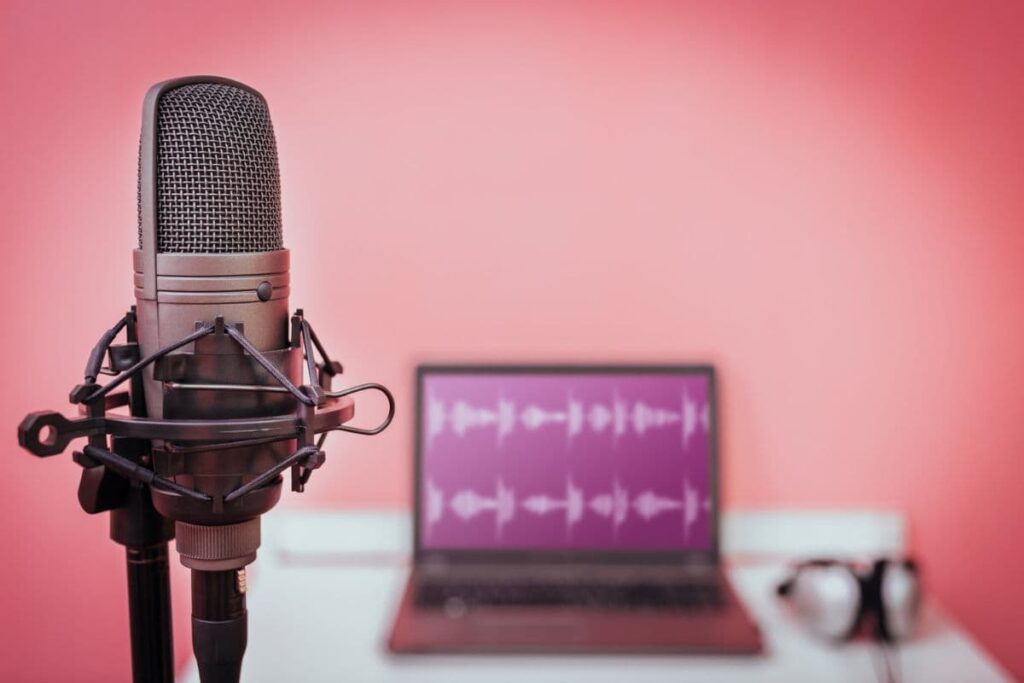Whether you’re gaming, vlogging, or podcasting, nothing’s worse than having a loop between your computer audio and your microphone. If this happens, you won’t be able to hear anything clearly. Furthermore, anyone on the other end of the mic will have trouble hearing what you’re saying or doing.
Your microphone is picking up computer audio because you might have multiple outputs selected, the computer’s drivers are outdated, or the speakers are too loud. Other issues include in-program settings and malfunctioning microphone ports. Set the mic as the input and keep it far from the output.
In this post, you’ll discover why microphones pick up computer audio, what you can do about it, and what happens if you don’t fix this common problem.
Table of Contents
- Why Do Microphones Pick Up Computer Audio?
- How Do I Stop My Mic From Picking Up My Computer Sound?
- Why Is Your Mic Picking Up Game Audio?
- Final Thoughts

Why Do Microphones Pick Up Computer Audio?
Microphones shouldn’t pick up computer audio if they’re placed in the right spot. Whether you’re using a microphone headset or a standalone microphone, it can get disrupted if the audio output is too close. Furthermore, you could cause audio problems if the computer and the headset are both selected as sound outputs.
Let’s take a deeper look at why microphones pick up computer audio below.
- Outdated computer drivers: If your sound drivers aren’t updated, they could cause all sorts of problems. For example, high-end microphones and speakers might not connect to outdated drivers. They could also make your microphone pull the input and output audio, making your computer’s speakers useless.
- Too many mic inputs selected: According to The Tech Wire, you might have two or more inputs selected, such as a headset and built-in computer speakers. When this happens, the audio splits and echoes. Your microphone will pick up the echoes, causing it to record and reproduce everything from the computer.
- Close proximity issues: When your microphone is too close to an audio output, it’ll pick up the sound immediately. For example, if you have a unidirectional microphone next to a computer speaker, the mic will pick up the sounds from the speaker. The good news is all you have to do is manage the distance to limit or eliminate this problem.
- Hardware problems: Unfortunately, not all microphones and speakers are compatible. If your mic isn’t compatible with your computer, there’s nothing you can do to eliminate this problem. You could try using various adapters, but they’re unlikely to work. This issue occurs because the computer tries to use the microphone as an audio output.
- High microphone sensitivity: All computers let you adjust a microphone’s sensitivity. When the sensitivity is too high, it’ll pick up everything around it. You might notice lots of white noise, vocal echoes, or audio picking up from the computer. This also happens if you’re using a headset and the built-in speakers are too loud.
All of these issues can create the dreaded microphone loop from your computer audio. Fortunately, you can fix, reverse, or replace these problems without having to get a new computer. Read on for a step-by-step tutorial about reducing and eliminating mic recordings of computer sounds.
How Do I Stop My Mic From Picking Up My Computer Sound?
To stop a mic from picking up computer sounds, follow these instructions:
- Turn down the speaker volume. If your speakers are too loud, your microphone will pick up the white noise. Reduce the volume until you can’t hear it in your microphone anymore. You can also move the microphone and speakers at least 12 to 18 inches apart to limit sound interference.
- Use a sound box with acoustic panels. For example, the XTUGA Recording Microphone Isolation Shield (available on Amazon.com) blocks white noise from all sides. It also prevents reverb, which makes your microphone sound much clearer. You won’t have to worry about it picking up speaker sounds from your computer, either.
- Reduce the microphone boosting settings. Microsoft Support suggests reducing your computer’s mic boosting option. Microphone boosting increases the microphone’s sensitivity and sound output if you’re recording. However, too much of it will make your microphone pull sounds from the computer.
- Make sure the microphone is the only input. If you have a webcam input or another device set as the input, every sound that comes from your computer will record or play through that mic. You’ll think it’s your primary microphone, but it’s actually a separate input device. Always ensure you only have one input.
- Adjust your microphone’s noise gate. The noise gate refers to the frequency and volume that the microphone picks up. If the noise gate is removed or it’s too low, your mic will pick up everything in the room (including whatever noises your computer produces). The noise gate should typically be slightly below half on the meter for most recordings.
I also recommend learning about the concept of noise floor. I’ve written a complete article on the topic where I also talk about adequate noise floor levels. What’s an Acceptable Noise Floor for Recording?
Why Is Your Mic Picking Up Game Audio?
Your mic is picking up game audio because your headset is too sensitive or you have the input as the output and vice versa. Turn down your game sounds and make sure you have the external volume off if it’s also coming through a headset. There could also be too much feedback if your headset or microphone is too close to another microphone.
Appauls states plugging your microphone into the wrong port could cause the computer’s audio to play through it. For example, if your laptop has USB ports that are used to charge the device, plugging a microphone into the USB port could send sound through the microphone and the built-in speakers.
Whether or not your microphone is used for gaming, it’s important to check whether you’re using inputs or outputs. Plugging your microphone or speaker into the wrong port can cause recording and playback problems. Check the sound settings to ensure you have the correct device selected, too.
Final Thoughts
Although it’s quite frustrating to have your microphone pick up the audio coming from your computer, this issue is relatively easy to fix. Check all of the settings, then move toward the potential hardware problems you learned about above. Don’t forget to keep the computer’s speakers far enough from the microphone.
- Review of the ALABS IRON MINI-WL: A Powerhouse Wireless Microphone - October 4, 2023
- What is a Saturator in Music Production: A Brief Explanation - May 11, 2023
- What Are Rotary DJ Mixers? An Overview - May 11, 2023
SoundStudiomagic.com is a participant in the Amazon Services LLC Associates Program, an affiliate advertising program designed to provide a means for sites to earn advertising fees by advertising and linking to Amazon.com. We also participate in other affiliate programs which compensate us for referring traffic.

